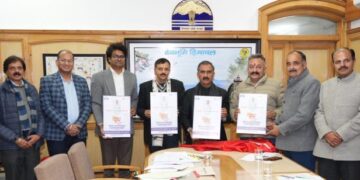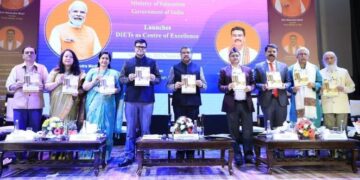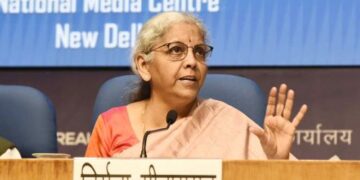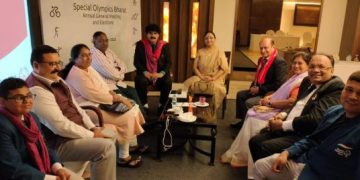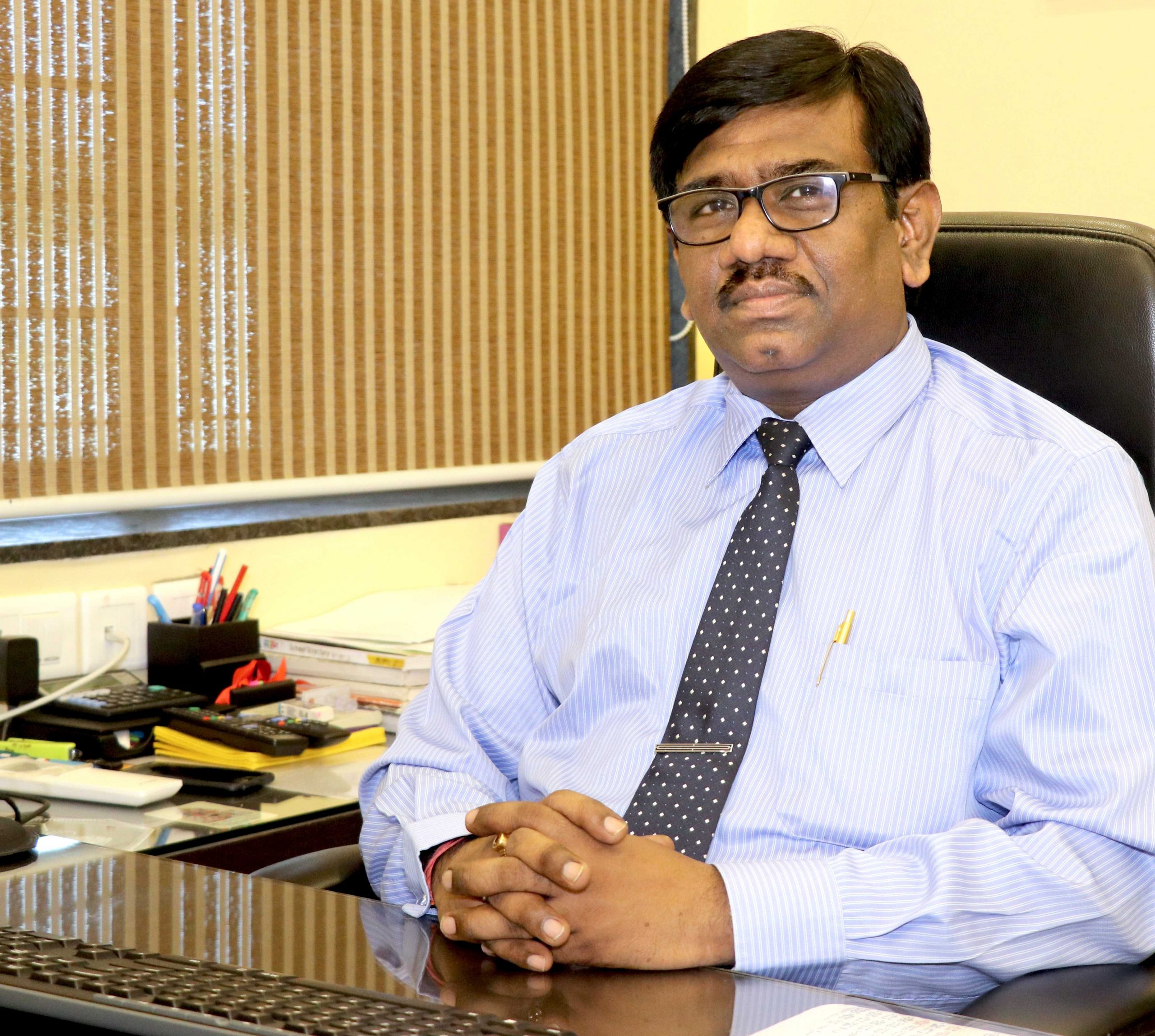 Dr.S.P.Dutta, Principal, Krishnagar Public School, Nadia (WB), who recently conducted training sessions on NEP 2020 for the teachers under COE Bhubaneswar and principals of Odisha CBSE-affiliated schools, discusses five challenge areas—ECCE, Foundational literacy and numeracy, Teach & Teachers Education, Curriculum and Pedagogy in school and Equitable and Inclusive Education: Learning for All— vis-à-vis enabling their implementation
Dr.S.P.Dutta, Principal, Krishnagar Public School, Nadia (WB), who recently conducted training sessions on NEP 2020 for the teachers under COE Bhubaneswar and principals of Odisha CBSE-affiliated schools, discusses five challenge areas—ECCE, Foundational literacy and numeracy, Teach & Teachers Education, Curriculum and Pedagogy in school and Equitable and Inclusive Education: Learning for All— vis-à-vis enabling their implementation
The National Education Policy 2020 (NEP) envisages far-reaching transformations for our existing education system. It is truly a significant stride towards making our education system meaningful, assimilative and skill-centric. The new policy seeks rectification of poor literacy and numeracy outcomes associated with primary middle and secondary schools and adoption of the multi-disciplinary approach in the higher education system.
However at the same time, there are a few suggestions on certain parameters that I would like to put forward in this regard:
- Early Childhood Care and Education:
It is praiseworthy that the NEP 2020 is putting so much of focus on Early Childhood Care and Education with new standardized curriculum designed by NCERT under the guidance of Special Joint Task Force of Ministries of HRD, Women and Child Development (WCD), Health and Family Welfare (HFW), and Tribal Affairs. However, there are certain areas that we need to rethink and plan before implementation: Firstly, Extensive training is required for teachers especially the existing Anganwadi Teachers whom the government is planning to use for this purpose. I don’t think mere digital/distance training mode using DTH channels as well as smartphones would be enough effective to train the teachers sufficiently.
ECCE teachers need to possess a lot of knowledge of both cognitive and metacognitive skills in order to achieve learning outcomes. They should be able to interpret what young children feel, say and do and to maintain reasonable expectations from young children. This will require a lot of hand-holding, mentoring and sharing of experience. The Anganwadi can be paired with existing Preschools who have experience of handling children of this age-group so that the Anganwadi teachers can directly interact and learn from shared experiences and mentorship of experienced Pre-school teachers, who can even monitor and support them as and when required. It’s good that steps are taken to prepare initial cadre of high quality ECE Teachers as government plans to introduce 6 month certificate program in ECE or 1 year diploma program covering early literacy, numeracy and other aspects.
Secondly, another biggest challenge even with the existing system is the lack of a system of Registration and Certification of Pre-school systems which implies that there are no guidelines of basic requirement of facilities like size of classrooms, standard of safety and security and quality of infrastructure or mandatory presence of tools and equipment required for development of cognitive and psychomotor skills of children during early childhood. Since in all these years we are finally thinking of re-vamping our preschool system nation-wide, introduce ECCE Curriculum and pedagogy development, it is high time we introduce some system to monitor the basic facilities including safety of young children in the preschools.
- Foundational Literacy and Numeracy:
The initial pages of the Policy documents grandly state the ambitions and targets with which the Policy has been framed. Somehow, as we reach the section of Foundational Literacy and Numeracy it articulates the foundational learning outcomes with the notion of ‘basic’ ability to read and comprehend basic text and the ability to carry out basic addition and subtraction with Indian numerals even though the same Policy document states that – “The rest of this policy will become relevant for our students only if this most basic learning requirement (i.e. reading, writing and arithmetic at the foundation level) is first achieved.”
In our country where parents still prefer their child to accompany them to the fields instead of sending them to school the target of achieving of 100 % foundational literacy and numeracy seems to be a dream but it is achievable. The provision for giving breakfast in addition to mid-day meals to the students so that they can be lured and made to come school will be a good initiative but this will ultimately result in a high pressure on the government exchequer only. In rural India, student presently come to school with utensils instead of books and copies to have the mid-day meal and leave just as the meal is over. Majority of the learners do not have access to early child care so going to school is still a dream by whatever name we called them may be aganwadi or ashramshals.
As per the 2011 census Bihar has the lowest Literacy Rate of 63.82 % whereas the average Literacy rate of our country is 74.04%. Keeping these data in mind, the policy makers need to formulate alternative methodologies where education is not restricted to infrastructure. Radio programme, TV Programme in addition to modern aids must be used to achieve the 100% target. Quality books should be made available to the needy through government provisions. Adequate stock should be there in public libraries which can be accessed by all and sundry. Moreover, to actually make our foundational education relevant and befitting of turning the entire ambition of this Policy into reality, ‘basic’ should be interpreted as those significant cognitive and psycho-social skills that are necessary to interact with and interpret the world. ‘Basic’ must mean the necessary thinking structures that the children must have or must develop to be able to become the mentioned ‘lifelong learners’. The understanding of these ‘basic’ skills must shift from mere reading and writing to language proficiency from ‘basic’ mathematical operations of addition and subtraction to mathematical and spatial thinking through scientifically researched pedagogic practices.
While most part of this segment in the Policy deals with the issue of making ‘foundational’ education accessible to all children focusing especially the children belonging to the disadvantaged areas, it does not highlight on the ‘quality’ of education. Unless we stress on quality as much as we stress about accessibility, the outcomes of the policy in the later stages will be achieved only by the students from a more privileged clusters (if at all) and would never become part of the expectations and aspirations of students all across the nation irrespective of other privileges. The increased participation of SEDGs in the schooling system will be strengthened resulting in a promising return.
- Teacher and Teacher Education:
Teachers should develop a global context for teaching and learning, or develop additional contexts that help students explore the relevance of their inquiry (why it matters) and for this NEP recommends Continuous Professional Development (CPD) and each teacher will be expected to participate in at least 50 hours of CPD opportunities every year for their own professional development driven by their own interest and passions. However, it should be in a planned manner for example 1 hour of training every week compulsorily in a schedule manner. Time table may be planned in such way that one teacher is released every week to attend the training session and upgrade themselves.
Continuous development in a phased manner like we recommend for students is always long term and far reaching. Same policy may also be adopted for Principals and Heads. Moreover, the training should not be only on pen and paper rather it should be provided to the teachers as a part of refresher training course. The General Education Council should be given free hand to unbiasedly assess the worth of the teachers through the National Professional Standards set for the teachers both in rural areas as well as in urban areas. The teachers teaching in schools situated in rural India should be given the same scope to participate in various activities when compared to their urban counterparts. Teaching still, to many of us is an alternative profession so rigorous training needs to be imparted so that we can give our best to the future citizens of the country.
There is a need to revamp the entire teaching learning process of Bachelor of Education course (and which is happening) keeping in mind the multidisciplinary and integrated approach of curriculum that the government intends to provide to the learners right from their early childhood and fortunately one of the main aim of NEP is to support and nurture teachers through all phases their tenure.
- Curriculum and Pedagogy in school:
Learning Should be Holistic, Integrated, Enjoyable, and Engaging-The Policy documents talks of a shift to new 5+3+3+4 design of school education but somehow does not justify the need and rationale behind it. Schools and teachers need to be briefed clearly and intensively before turning this structure into reality. The Policy also stresses on ‘greater flexibility and student’s choice of subjects. Before this is implemented for Board appearing students especially at the Senior Secondary Level it is essential that directives of admission criteria for Colleges and Higher Education institutes must be made crystal clear so that there is no scope of ambiguity leading to loss of a students’ academic year because of unacceptance from Institutes due to subject combination chosen at school level.
As we plan to move ahead with outcome-based learning, we need to focus on the learning styles and MI of students. Students to be grouped on the basis of their learning styles and pedagogy to be designed accordingly. Learning outcomes to be specific as per class and subject and not generalized. Education standard and practices requires schools to facilitate and promote collaborative learning for the purpose of curriculum development and review. The curriculum must provide continuity and outline a progression of learning. Moreover, the objectives therein should guide teachers in making decision about developmentally appropriate learning experiences including formative and summative assessments.
As students develop the vertical articulation of subject content over the years, teachers should plan increasing complex units of work that encompasses multiple objectives within which discrete tasks of smaller unit of work might concentrate on specific objectives on individual strands. Horizontal articulation of each year should coordinate teaching and learning across all courses as well as to identify shared conceptual understanding which in turn should help to create a coherent learning experience for students throughout the year.
- Equitable and Inclusive Education: Learning for All:
We talk of inclusive education but in practice we hardly follow the same. Even if we follow that comes under pressure. The schools in India are not even aware of the rules to be followed for inclusive education and we do not have that infrastructure even to cater to the varied needs of all types of learners. Broad and clear policies should be set out and made available to all the stakeholders so that anyone can claim their basic right to education. Adequate provisions for training the family members of gifted and especially able children should be done at schools so that teaching learning process becomes joyful rather than a burden.
As suggested by NEP and believed by all educationist the Principle in all circumstances is to focus on what students CAN do not on what they CANNOT. It is universally accepted that school plays a vital role in defining student’s future lives, including their leisure and pleasure. For students with physical injuries or disabilities, it may be vitally important that they undertake appropriate activities which may include exercise or therapy (perhaps something that is presently missing).
In addition to Divyang, students who have suffered psychological traumas need appropriate support to help them rebuilt their confidence. Specially designed activities that craters to their mental needs to be designed through group discussion among teachers, counsellors, special educators and parents as well.
I am sure the implementation of this policy, if done effectively keeping in mind the practical challenges in our system, will make the pedagogy more experimental, holistic, integrated, discovery-oriented, learner-centric, discussion-arousing, flexible and enjoyable.
Over the last three months there has been a lot of research and experimentation on implementing NEP in the true sense at all levels of educational pedagogy. In his speech Prime Minister Modi did explain how NEP 2020 aims to shape Indian students into Global Citizens and aspires to lead them effectively into the 21st century. He also praised the policy as being helpful in structuring the thought process of the students and help them ‘How to think’ instead of ‘ What to think’.
According to our Education Minister Ramesh Pokhriyal ‘Nishank’ , “NEP 2020 will equip India to hold a position in global knowledge system and NEP 2020 has been implemented with a futuristic mindset, thereby turning the challenges into opportunities”.
As Educators, we all are looking forward with open and optimistic mindset to accept these much-desired changes in our education system. We are really hopeful that the implementation of this highly-anticipated policy will establish a new world of learning for our coming generations. NEP 2020 will surely play a significant role in producing quality human resources who will be equipped not only with knowledge of the content and desired intellect, but also with essential skills, values and attitude, to face the challenges in the path of future success to navigate our nation in the desired direction of growth and development.



